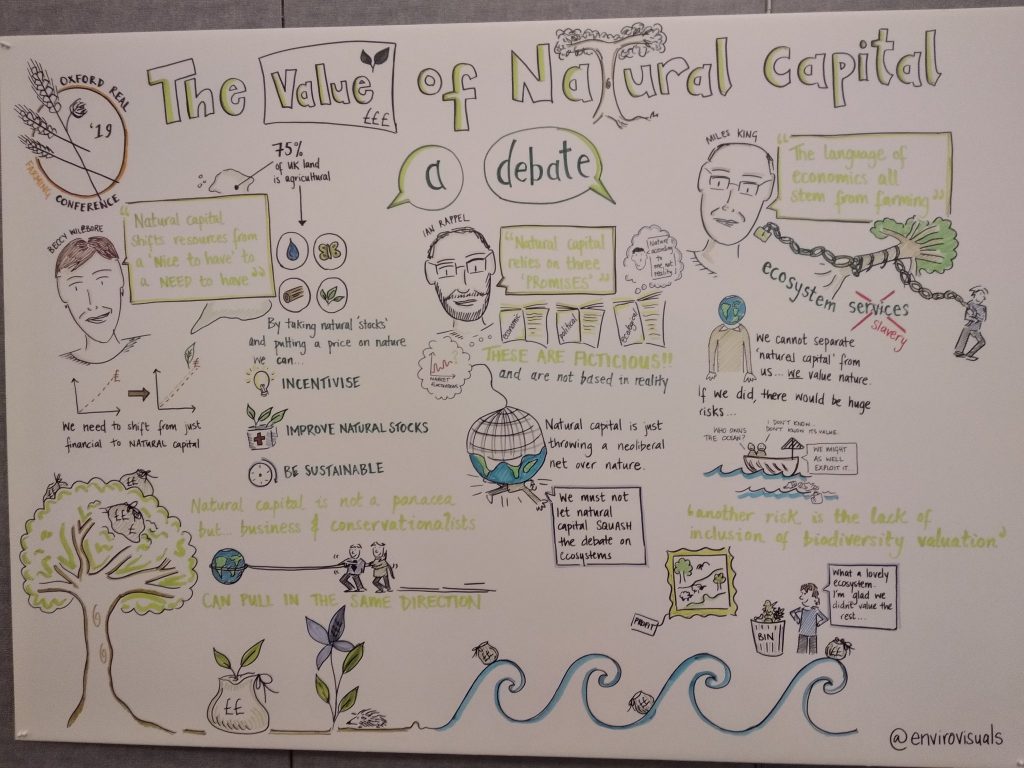
Last week’s 10th Oxford Real Farming Conference was bigger than ever, with over a thousand delegates attending – and nearly as many again, on the waiting list for returned tickets. The conference was spread over even more venues this year, to cater for the extra people, and the organisers also used a local church/community centre, as the food venue, where an eclectic mix of stalls provided sustainably produced and cooked food, catering for vegans and meat eaters alike.
As usual, there were many different sessions covering topics from the ever present questions over how Brexit will impact on food producers in the UK, through to the more esoteric – including soil health, agroforestry and genome editing; to food labelling, land reform, and the county farm sell-off. (As I was only able to go to a small selection of the sessions, this review will be very selective. Lush’s Ben Davis is also writing about the conference so look out for his upcoming piece about about other topics covered by the conference.
The conference kicked off (for me) with a session on the Agriculture Bill which is currently passing through Parliament. Sustain’s Vicki Hird joined Tom Lancaster from RSPB and farmer Stephen Briggs to discuss the “good, the bad and the ugly” of the Bill. Vicki expressed her concerns that the Bill was potentially just greenwash and all the fine words about “public money for public goods” would come to nothing if all the powers were handed to Government ministers. Farmer Stephen Briggs was disappointed that so few farmers were actively engaging and seeking to influence the content of the Bill, preferring to “sit on their hands” until the decisions had been made.
A far more uplifting session was to be found in the main hall (of the rather grand Oxford Town Hall) where Palestinian seed library founder Vivien Sansour, “the Seed Queen of Palestine” showed a film (which can be found here) which tells her story.
A story of love and resistance
It is a story of love and resistance by growing traditional cereals, fruit and vegetables. Sansour returned from working in Mexico to realise that heirloom varieties which the Palestinians had grown for generations were disappearing – these included a special drought resistant “dark” wheat; a giant variety of watermelon and a purple carrot variety, which was used in a traditional dish where it was stuffed with pine-nuts (it was her mother’s favourite dish).
Sansour searched for these lost crops – was repeatedly told they no longer existed but did not give up hope. Eventually, she found that they were still being grown (almost in secret in some cases) despite the immense difficulties inherent in that region. Big agribusiness is taking over the land, to grow things like tobacco – as she put it, crops like tomatoes, grown under plastic, which are cheap and have no flavour.
Sansour explained how saving heirloom varieties and encouraging farmers to grow them again, brings people together and helps them believe that their lives do have value despite what they are told. She has created a mobile kitchen which cooks food with these heirloom varieties to encourage Palestinian communities to rediscover their food culture. She also made a passionate case to argue that seeds belong to people, not companies, and explained how every grandmother in Palestine used to have a tin full of saved seeds to plant in the next season.
From the sublime to the…. Next on stage was Environment Secretary Michael Gove in a session with Labour MP and environment stalwart Kerry McCarthy. Much of what Gove said was familiar and there was little new – although apparently he expressed some sympathy with the Sustainable Food Trust’s Patrick Holden, who asked him when he was going to introduce a Nitrogen Tax, to help reduce the enormous excess of Nitrogen in the farmed (and wider) environment.
The spiritual value of Nature
With my People Need Nature hat on, I was involved with two sessions at the ORFC – one was a debate on natural capital, the other, on the spiritual value of Nature. While it would be inappropriate for me to write on how great these sessions were, I certainly enjoyed helping to organise them and take part. The audience was very lively in both and I hope they went away with much to think about on both of these, closely interrelated topics.
Much of what I said on natural capital can be found in an earlier Lush Times article, here. I set out a bit of a challenge to the audience (many of whom were farmers) asking them whether – and if so how – they could provide opportunities for people to have spiritual experiences of Nature on their farms – and whether these would qualify as “public goods” for which they might be paid by the Government. In truth I think this is unlikely, but you never know.
Two French environmental law and agriculture policy experts (Ludivine Petetin of Cardiff University and Viviane Gravey of Queen’s University Belfast) who have made their homes in the UK, provided a very interesting and informative session looking at how the Common Agricultural Policy is likely to change in the coming years, partly as a result of the UK leaving the EU but also because it was going to happen anyway.
The upshot of their research (for an upcoming Soil Association report) is that the Common element of the EU-wide agriculture policy is likely to become increasingly weak in the coming years, as each member state adopts its own approach, under a loose common framework. They argued, with strong evidence, that the UK had made its own mess of the CAP by implementing it in unhelpful ways. For instance, Michael Gove had complained that the CAP restricted payments to farmers who owned over five hectares of land and that leaving the EU would enable the UK to support small-holders. Not so! Over half of all EU member states paid support to farmers with less than 5ha of farmland – the UK had just decided not to.
Promoting agro-ecology
In Italy, CAP funds were being used to support care farms – with 400 social/agricultural cooperatives being funded to provide a range of support for social inclusion and care, rehabilitation and education through growing local sustainable food. The UK could have adopted this approach but chose not to.
Meanwhile, in France CAP funds had been used to promote agro-ecology through France’s many agricultural schools and colleges. Though this had prompted some backlash against what was derisively called “the new religion of agro-ecology” France also has a grassroots movement known as “We want poppies” where citizens, inspired by agro-ecological principles, are campaigning against the ubiquity of pesticide use. Sustain, the Land-workers Alliance and others, will continue to lobby for agro-ecology to appear explicitly in the UK Agriculture Bill.
As has been my experience in the past, I found the Oxford Real Farming conference inspiring and also a great opportunity to catch up with old friends and make new ones. I would certainly recommend it to anyone with an interest in food, farming and Nature. But I also predict tickets will sell out even more quickly next year.
this article first appeared on Lush Times

Comments are closed.